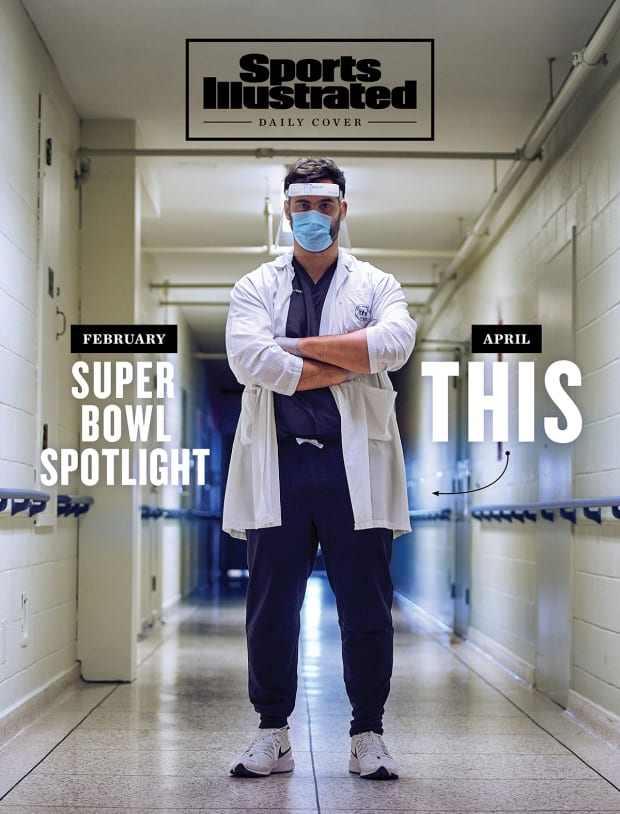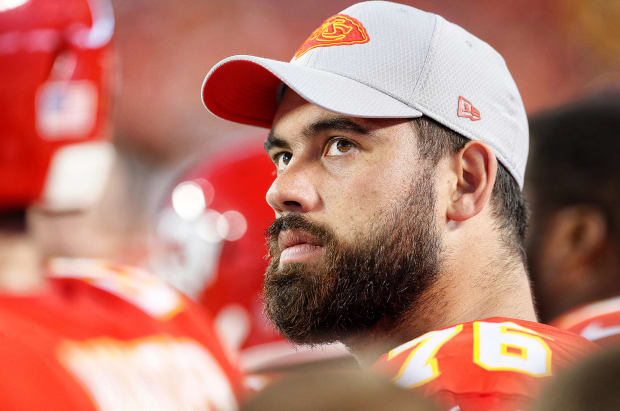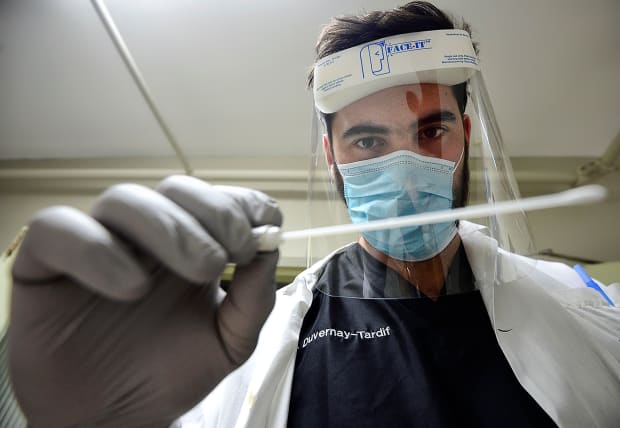Three months after helping the Chiefs to a Super Bowl victory as their starting right guard, Duvernay-Tardif is putting his doctorate in medicine to use: fighting the coronavirus outbreak at a longterm care facility in Quebec.
Three days before Super Bowl LIV in February, a reporter asked what I thought about the coronavirus. Crazy, right? Back then, I had read a little and knew what type of virus it was and that there were a few thousands cases in China. I told the reporter as much, but added that I was trying to focus on football going into the biggest game of my life.
After my team triumphed, I went back to the parade in Kansas City, which is totally inconceivable right now. Adding a million people in the streets? Piled up on top of each other? Drinking and cheering in subzero temps? It’s so wild to even think back to then, this time two months ago that feels like another lifetime.

I went back to Montreal after the celebration. Life was chaotic then, but in a different way. I had two hectic weeks of appearances, including my own parade in Montreal, where like 4,000 people showed up in the snow to cheer me on. To see that community of Chiefs fans north of the border was touching for me.
I hold a doctorate in medicine. I don’t have a specialty yet, and I haven’t done the residency portion of the program. And while I don’t watch many games on television, I do know how big of an industry sport is. When the NBA halted its operation and so did the NHL, it really hit me. I remembered the reporter from the Super Bowl and her question.
I went on vacation on Feb. 28, leaving with my girlfriend, Florence, to sail on a rented 40-foot-long boat around the Caribbean, just the two of us. I had to decompress. There hadn’t been a day when I wasn’t super busy since well before the Super Bowl. And I knew that when I came back from the trip, my work at the LDT Foundation would demand much of my time. Our mission is to promote the balance of sport, art and study in 10 different local schools, and the programs we do take place every week. I was ready to rest and dive back in and resume my training with a fresh mindset.
On the water, our Wi-Fi was not always good. But I kept up to date with the virus, when it first moved to South Korea, then a few countries in Asia, then Iran, then Europe and then the U.S. Eventually, I knew we needed to get back to Montreal, and we changed our departure date to March 12 because we didn’t want to get stuck. As we were boarding the plane, I got an alert on my phone saying that starting that night at midnight there was going to be an isolation period for every traveler coming back from outside Canada.
On the return flight, I remember there were kids in front of me, or to the side, and they were climbing on stuff or spitting everywhere. Families were giving each other iPads. People were talking about how they were going to go back to work the next day. I wondered: Am I the only one who actually heard that? I asked, “Do you guys know that you’re supposed to stay at home for 14 days?”
“No way,” many of them said. “Are you kidding me?”
I don’t blame them. If you don’t read the news when you’re on vacation, you don’t think about that stuff. And coming back, I remember grabbing my backpack from the carousel and looking at those people in the airport and thinking, there’s just no way those people are going to stay home for 14 days. There’s no way all of these people tomorrow are just not going to go to work. Next thing you know there’s like four billion people in the world who are doing that. And that’s only in a month. It’s wild how everything went so fast.

The difference between the moment I left and the moment I came back was so intense. I had only wanted to get away, and then I wished I had never left. Everything had stopped.
We did 14 days in isolation. By the time we finished, pretty much every state and every province and every country was at the same kind of place. It was an adjustment. All the schools for the foundation had closed. You start asking: Are we going to cancel our charity golf tournament in June? Our big auction in April? Plus, the border is closed. It’s not like I could get back to Kansas City, with my teammates, when we were supposed to begin training for next season.
At the same time, I realize that I’m privileged. I didn’t lose my job. I don’t have three kids at home and a Zoom meeting and home school to teach. I know a bunch of my friends are going through difficult times; many are physicians who I met in medical school. I have friends who are working in emergency rooms. One does triage and tests patients for COVID-19. Those people are on the front line, and they’re giving everything to protect us. I don’t want to complain or anything. Because at the end of the day, I have a nice apartment, and I’m working from home, and I’m lifting from home.
Soon into the crisis I started to ask how I could help. I reached out to the health ministry and public health authorities, but found out that I fell into a gray area where they didn’t know what to do with me, because I don’t have a license to practice—yet. In the interim, officials briefed me on an almost daily basis, and I used my platform and credentials to relay their messages. In Montreal, for a while, the age group most infected was people between 20 and 29, so there was an issue with enforcing those social distancing measures. I tried to reinforce the need for them.
I did a bunch of interviews with different media entities, and one day, while doing them from my apartment, I looked out and saw people gathering at a picnic table in plain sight. It was so frustrating. You know, this is not like a disease where there’s a simple, magical pill, to make it go away. It’s a virus. The best we can do is supportive measures. It’s simple: Stay home and try to minimize your interactions with people. Follow the guidelines. We need a vaccine, and it’s going to take another year or so to get it.
If we don’t follow the guidelines, more people are going to die. The mortality rate is going to be closer to 5 percent than 1 percent, where it should be. If you stay at home, it's relatively easy, when you think about all those doctors like my friends who are at risk. They’re doing that to protect us. It’s irrational to not respect those measures. It’s such a small individual sacrifice for the greater benefit.
A few days ago, health ministry officials started a campaign to recruit health care professionals, especially students in medicine and nursing. It’s now possible for me to go back and help. I had already wanted to, but when it’s real, it hits you, the gravity involved. Now, the discussion shifts from I want to go back to how am I going to go back? I discussed with my girlfriend whether we will continue to sleep in the same bed or live in the same apartment. These conversations made me realize even more the sacrifices that people in health care, on the front line, are making.
I had to check in with the Chiefs from a contract standpoint. They’ve been amazing. They were proud of the fact that I wanted to go help. They said they would support me.
First, I registered for a crash course, where I reviewed the basics of how to put a surgical gown on and learn all the steps for sanitizing, because that stuff is more important than ever, to protect not only yourself but your patients. Then I would most likely end up in a long-term care facility, because that is really where they need people in Quebec and in Canada in general. We got hit hard in those places. They need help to replace the health care workers who have been sick and to help with the increasing demand, because of the increasing number of cases and because all the measures taken to protect health workers and patients slow down the operation.

My first day back in the hospital was April 24. I felt nervous the night before, but a good nervous, like before a game, and I packed everything neatly: scrubs, white coat, extra pens, even a second pair of shoes that I could leave in my locker, knowing they were clean. I wasn’t aware the Chiefs had drafted a running back that night in the first round, even though I will block for my future teammate, Clyde Edwards-Helaire, from LSU.
I was assigned to a long-term care facility near my hometown, Saint-Jean-sur-Richelieu, which is about an hour from Montreal. On my drive in, I thought about my own draft experience, back in 2014, when I missed a second-day draft party at my house because I was working at the hospital, in an intensive care unit, helping with an emergency C-section. The Chiefs took me the next day, in the sixth round.
My shift started at 7:30 a.m. I found out that I would be working for now in more of a nursing role, helping relieve the workers who have already been in place. There’s so much that needs to happen just to visit with every patient—masks donned and hands washed and equipment like gloves and visors tugged on and off and thrown away. I handled a medication cart, making sure to administer the right dosage and in the proper way. Honestly, I was drained after—and looking forward to going back.
There was one positive test for COVID-19 at the same facility. Officials had set up a makeshift space in the cafeteria with 15 beds to be filled any time a patient comes down with symptoms. So far, due to those types of measures, the virus has not spread to other patients yet.
It’s wild to think that just 10 weeks earlier I played in the biggest game in sports. I was reminded of that even at the facility, when one of the people training me turned and said, “You’re the football player, right?” When I answered yes, he said, “Bro, you just won the Super Bowl.” Indeed, I told him, and now I just want to help.
Playing in the Super Bowl vs. heading back to the medical system during a pandemic is totally different. Back in February, I knew that 100 million-plus people were going to be watching, and I wanted to win. When you’re going in to help it’s more about your duty as a doctor and a citizen. It’s not the time to be the hero and be impulsive. You’ve gotta do it the right way. You’ve gotta really take this seriously when it comes to washing your hands, not touching anything. I know it sounds silly; it’s simple stuff. But when you’re in a long-term care facility where there are cases, you know for sure you’re going to be exposed if you don’t take those appropriate measures. You know there’s risk involved.
Now, the big topic is how we’re going to return the economy. How fast is too fast? And we can extrapolate that to sports in general. Sport is really important; it’s a connective tissue for society. But it is not an essential business. It’s going to be interesting to see what will happen when it comes to baseball, hockey, basketball and, eventually, football in September.
I currently serve on the NFLPA’s task force, joining experts from across the country to examine different scenarios for the safest measures to put in place when the game returns. We will look at how teams will train, how they will travel and how the games will take place and, since this is the NFL, a league with a lot of resources, it seems like every option is on the table. For now, we’re just getting started.
It’s too soon to say when sports might come back. Or what that might look like. What I can say is if we’re not playing in September, knowing all the implications of what sport means for a nation and the money behind this huge industry, there are going to be bigger issues than not playing football.
Post a Comment
Post a Comment